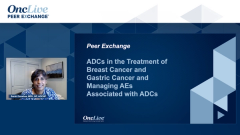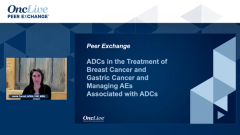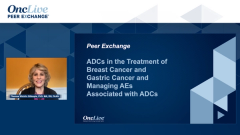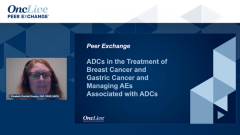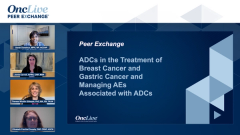
Ongoing Clinical Trials With T-DXd in HER2+ Gastric Cancer
Panelists briefly review ongoing clinical trials with trastuzumab deruxtecan in the setting of HER2+ gastric cancers.
Episodes in this series

Transcript:
Sarah Donahue, MPH, NP, AOCNP: Theresa, what are some of the other ongoing trials with trastuzumab deruxtecan in patients with metastatic gastric cancer?
Theresa Wicklin Gillespie, PhD, MA, RN, FAAN: I think we’ve mentioned before, the DESTINY-GASTRIC01 trial (NCT03329690); that was the first one that was done, in Japan and Korea. And I think Liz may have cited some of those data. But that really set the stage in terms of using these drugs and how people might be experiencing them in terms of toxicity profile. I think I mentioned earlier that some of the adverse effects were a little elevated, and there was some thought that perhaps that was seen primarily in the Japanese testing site.
The second trial, which was the DESTINY-Gastric02 (NCT04014075), was done with European and U.S. patients. There were only 79 patients in that study. That was a monotherapy, and so the same dosage of 6.4 mg/kg every 3 weeks was prescribed. They did see a very promising, about 38%, response rate. And median progression-free survival was about 3.5 months, and that lasted about 4.3 months in some cases. So that we have some preliminary data from. And again, this was from a Western population, so there’s thought that perhaps those findings are maybe a little more applicable. I will say that there was, I think for our population, a high incidence of pneumonitis and ILD [Interstitial Lung Disease], about 4% of pneumonitis and 2.5% of ILD. And those are not small numbers for such serious side effects. They obviously were not as high as what was reported in the Gastric01 study with Japanese patients, but those toxicities are occurring. Since then, there’s been the DESTINY-Gastric03 trial (NCT04379596).
It’s a phase 1B-2 trial looking at monotherapy and then other combination therapies in a dose escalation and expansion trial. That will be very interesting to see the other kinds of combinations. In oncology, more is always better, and so we don’t want to just give 1 drug if we can give 2 or 3 or 5 drugs. But this trial will help us determine if that is the case in terms of efficacy. And then the other study is the DESTINY-Gastric04 (NCT04704934). This is a randomized phase 3 study, and this is a head-to-head study. So that will give us some very interesting data in terms of comparative data, and overall survival is the primary outcome there. So I think that will be very important in really evaluating this particular type of therapy and its application in the gastric cancer population.
Transcript edited for clarity.


